 In the first part of this blog series, we discussed the benefits of physical activity at camp. There are underlying advantages to this that directly relate to nutritional habits. Research shows that that the more time children spend doing passive activities such as watching television, sitting at a computer, or playing video games, the more likely they are to overeat. The reason for this is simple. A sedentary lifestyle leads to boredom. Nutritionists assert that lack of activity mars a child’s ability to determine the difference between boredom and hunger. Unfortunately, according to dietician Jennifer Thomas, the increased amount of free time and lack of structure that often comes with summer break makes children particularly vulnerable to tedium and excessive food consumption. Says Thomas, “A child can pick up 5 to 10 pounds over the course of a summer, so it’s important to recognize the difference between boredom and hunger.”
In the first part of this blog series, we discussed the benefits of physical activity at camp. There are underlying advantages to this that directly relate to nutritional habits. Research shows that that the more time children spend doing passive activities such as watching television, sitting at a computer, or playing video games, the more likely they are to overeat. The reason for this is simple. A sedentary lifestyle leads to boredom. Nutritionists assert that lack of activity mars a child’s ability to determine the difference between boredom and hunger. Unfortunately, according to dietician Jennifer Thomas, the increased amount of free time and lack of structure that often comes with summer break makes children particularly vulnerable to tedium and excessive food consumption. Says Thomas, “A child can pick up 5 to 10 pounds over the course of a summer, so it’s important to recognize the difference between boredom and hunger.”
Concern about the obesity crisis has sprung to the forefront of the camping industry. Cedric Bryant, Ph.D. and Chief Scientist for The American Council on Excercise, was a keynote speaker at the 2011 American Camp Association’s (ACA) National Conference, attended by thousands of camp professionals. In his address, Dr. Bryant discussed the growing issue of obesity and praised the ability of summer camp to transform poor habits through exercise. Most traditional summer camps offer children a healthy mix of hobbies and athletics. Camp staff members encourage campers to participate in everything that’s offered to them, even that which they might not necessarily do or try at home.
There is also something to be said for the fact that many summer camp activities, including dining, are scheduled into a child’s day and carried out in a group setting. Access to food is limited throughout campus, and eating is typically not permitted in bunks. 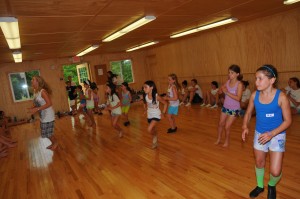 Quite simply, obtaining food at camp is not as easy as walking into the pantry or opening the refrigerator on a whim for lack of something better to do. New research has established many benefits to family meals. One potentially underrated advantage is that dining as a unit may keep consumption in check by limiting what nutritionists call the “eating area”, the combination of time and space in which eating occurs. “This strategy can help determine if they [children] are really hungry or just bored,” says Thomas. Meals at summer camp are held at specific times in a designated place—usually a dining or mess hall—and campers dine together, often with their bunkmates. Counselors supervise, insuring that everyone receives food and reporting any changes in a camper’s eating patterns.
Quite simply, obtaining food at camp is not as easy as walking into the pantry or opening the refrigerator on a whim for lack of something better to do. New research has established many benefits to family meals. One potentially underrated advantage is that dining as a unit may keep consumption in check by limiting what nutritionists call the “eating area”, the combination of time and space in which eating occurs. “This strategy can help determine if they [children] are really hungry or just bored,” says Thomas. Meals at summer camp are held at specific times in a designated place—usually a dining or mess hall—and campers dine together, often with their bunkmates. Counselors supervise, insuring that everyone receives food and reporting any changes in a camper’s eating patterns.
The four day 2011 ACA conference also featured seminars that addressed issues such as how to work together to improve the  overall health and nutrition of campers, understanding the relationship between nutrition and wellness and using that knowledge to help campers be high achievers through healthy bodies and minds, and adding healthy options to dining room menus, particularly for those campers who require special diets.
overall health and nutrition of campers, understanding the relationship between nutrition and wellness and using that knowledge to help campers be high achievers through healthy bodies and minds, and adding healthy options to dining room menus, particularly for those campers who require special diets.
Indeed, though many camps are constantly striving to improve in these areas, the notions introduced in these seminars are not new. Meals served by most summer camps are carefully planned and balanced in accordance with USDA recommendations. Many camps also encourage their campers to make healthy choices at mealtimes by providing several fruit options in the morning and salad bars at lunch and dinner. Vegetarian alternatives are typically available and, increasingly, more attention is being given to rising nutritional challenges such as diabetic or gluten free diets.
All of this is enough to make summer camp worth considering as a combatant to the type of lackadaisical lifestyle that leads to poor eating habits and, possibly, obesity.



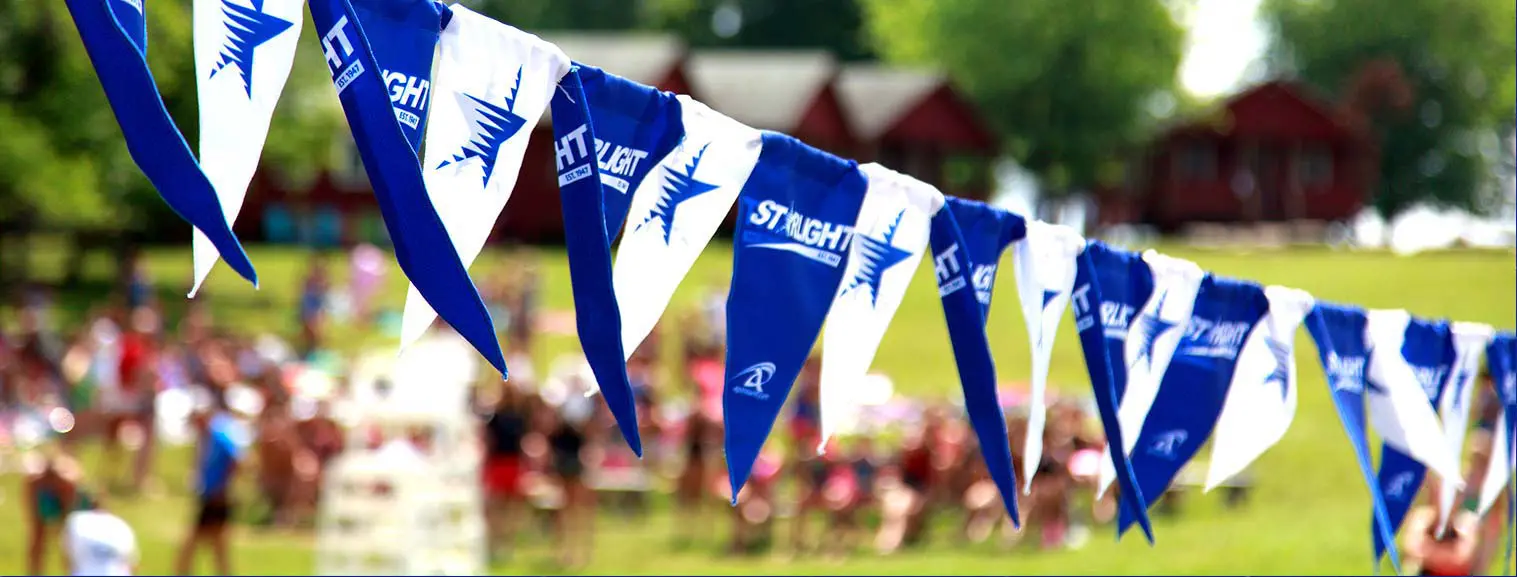
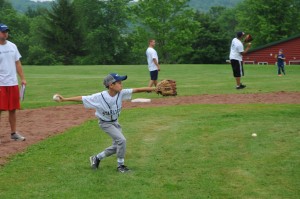
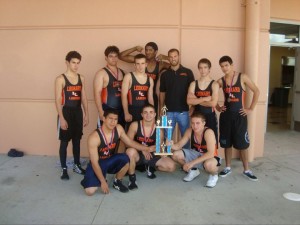
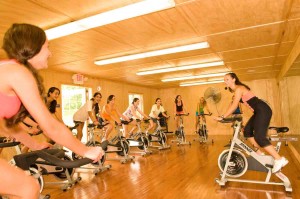
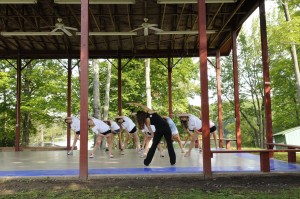
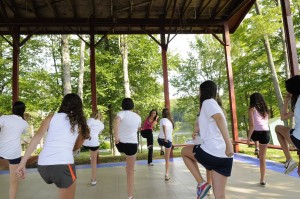
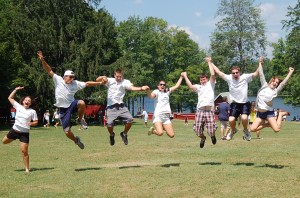
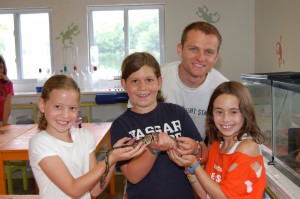
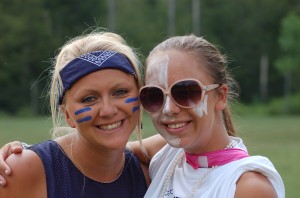
 Whether your Holiday Season has ended or is about to begin, summer camp season isn’t far away! In fact, on December 8th 2010, next year’s campers wore their camp shirts in numerous cities to mark the 200 Day Countdown To Summer. If you’ve never gone to camp, it may be difficult to understand what drives this passion for camp all year—but campers know that camp is contagious, FUN, and essential! The camp experience helps children develop into well-rounded adults in enormous and complex ways, and that’s really important—but having FUN and intense youthful experiences is how it all happens. That’s the brilliant combination of camp. The experience includes serious AND hilarious moments—often simultaneously! The whole experience is much like the two sides of a single coin, or the double-faced image of Janus, the Roman god who can see into the past and future at the same time—and the origin of the name for the first month—January.
Whether your Holiday Season has ended or is about to begin, summer camp season isn’t far away! In fact, on December 8th 2010, next year’s campers wore their camp shirts in numerous cities to mark the 200 Day Countdown To Summer. If you’ve never gone to camp, it may be difficult to understand what drives this passion for camp all year—but campers know that camp is contagious, FUN, and essential! The camp experience helps children develop into well-rounded adults in enormous and complex ways, and that’s really important—but having FUN and intense youthful experiences is how it all happens. That’s the brilliant combination of camp. The experience includes serious AND hilarious moments—often simultaneously! The whole experience is much like the two sides of a single coin, or the double-faced image of Janus, the Roman god who can see into the past and future at the same time—and the origin of the name for the first month—January. The serious side of camp includes feeling part of a unique community, identity development and participating through the years to make irreplaceable memories. If you don’t understand why camp is such an important American institution, in 1998 Ira Glass and the This American Life radio program attempted to investigate the topic—
The serious side of camp includes feeling part of a unique community, identity development and participating through the years to make irreplaceable memories. If you don’t understand why camp is such an important American institution, in 1998 Ira Glass and the This American Life radio program attempted to investigate the topic— It also highlights how fun, tradition, stories, community and being human are all part of identity development at camp. With his signature quirky style, Ira assembled more “truth is stranger than fiction tales,” where real campers tell stories of camp in days gone by and explain why the camp experience is so special. Hundreds of campers responded to his call for stories and the program shares a selection, so if you’re interested in history and interpreting American culture, you’ll find the reminiscences fascinating. Just remember that all camp experiences are not like the stories told—the point of the program is to illustrate the intensity of the experience! It ends with campers talking about becoming camp alumni and how their camp experiences won’t ever be forgotten.
It also highlights how fun, tradition, stories, community and being human are all part of identity development at camp. With his signature quirky style, Ira assembled more “truth is stranger than fiction tales,” where real campers tell stories of camp in days gone by and explain why the camp experience is so special. Hundreds of campers responded to his call for stories and the program shares a selection, so if you’re interested in history and interpreting American culture, you’ll find the reminiscences fascinating. Just remember that all camp experiences are not like the stories told—the point of the program is to illustrate the intensity of the experience! It ends with campers talking about becoming camp alumni and how their camp experiences won’t ever be forgotten. As we all know, time passes and our camp years are limited by the fact that we’re only children once. It’s easy to feel briefly melancholy at year’s end as time waits for no one, but of course, December also means that the promise of a new year is around the corner! In January, we’d like to continue looking backwards and forwards while thinking about camp and we’d especially love to hear from camp alumni. What’s the funniest thing that happened to you at camp? How did camp contribute to your adult life? We’d like to hear about the memories you hold dear and close to your heart, or what you wish for campers next year? If you’re counting the days until camp starts, what are YOU planning?
As we all know, time passes and our camp years are limited by the fact that we’re only children once. It’s easy to feel briefly melancholy at year’s end as time waits for no one, but of course, December also means that the promise of a new year is around the corner! In January, we’d like to continue looking backwards and forwards while thinking about camp and we’d especially love to hear from camp alumni. What’s the funniest thing that happened to you at camp? How did camp contribute to your adult life? We’d like to hear about the memories you hold dear and close to your heart, or what you wish for campers next year? If you’re counting the days until camp starts, what are YOU planning?
 What do camp counselors learn at camp that helps them later in life? The specific answers to that question are varied, but one thing remains constant—camp has a big impact on individual lives long after campers grow out of their camping and counselor years. Recently
What do camp counselors learn at camp that helps them later in life? The specific answers to that question are varied, but one thing remains constant—camp has a big impact on individual lives long after campers grow out of their camping and counselor years. Recently 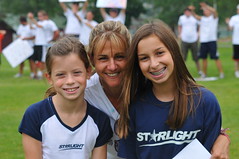 Kelly learned that “being a camp counselor is all about leading a group of people into enthusiasm,” and that continues to be important in her job today. Just as campers and staff still gather each summer—sometimes for the first time and sometimes after waiting all year just to come back—Kelly went to camp! There, learning, personal growth, fun and friendship blossomed during intense times and life-long skills and ideas were forged. Camp operates as a microcosm of experiences that mirror real-life situations as everyone negotiates friendships and different personalities, tries new things and finds their unique role in the group. If you’ve been a camper or a counselor, you know what I’m talking about. You also know that facilitating fun and teamwork takes creativity and enthusiasm. (If you’re thinking about being a counselor, camp is an incredible way to learn skills and prepare for future jobs!)
Kelly learned that “being a camp counselor is all about leading a group of people into enthusiasm,” and that continues to be important in her job today. Just as campers and staff still gather each summer—sometimes for the first time and sometimes after waiting all year just to come back—Kelly went to camp! There, learning, personal growth, fun and friendship blossomed during intense times and life-long skills and ideas were forged. Camp operates as a microcosm of experiences that mirror real-life situations as everyone negotiates friendships and different personalities, tries new things and finds their unique role in the group. If you’ve been a camper or a counselor, you know what I’m talking about. You also know that facilitating fun and teamwork takes creativity and enthusiasm. (If you’re thinking about being a counselor, camp is an incredible way to learn skills and prepare for future jobs!)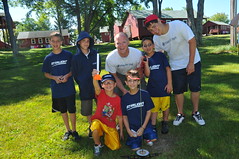 Another famous camper, Disney’s
Another famous camper, Disney’s 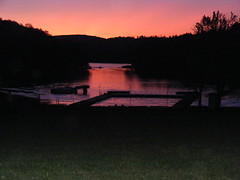 In
In 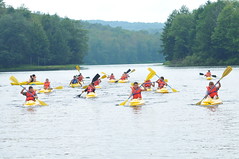 If you’re in Louv’s age bracket, you may also recall a childhood filled with a kind of free, natural play that today seems like an antique artifact compared to current kid’s lives. Lives filled with mobile devices, instant messaging, screen time, digital games and fears of “things” outside. In his book, Louv explores “the increasing divide between the young and the natural world, as well as the environmental, social, psychological, and spiritual implications of that change.” He discusses the accumulating research that implies that secure children (and adults for that matter) must connect with nature to fully develop. This need for contact with the natural world is as imperative as good nutrition and adequate sleep. So, while multiple reasons give us less and less time to connect outdoors, more and more studies suggest that embracing nature is a human necessity.
If you’re in Louv’s age bracket, you may also recall a childhood filled with a kind of free, natural play that today seems like an antique artifact compared to current kid’s lives. Lives filled with mobile devices, instant messaging, screen time, digital games and fears of “things” outside. In his book, Louv explores “the increasing divide between the young and the natural world, as well as the environmental, social, psychological, and spiritual implications of that change.” He discusses the accumulating research that implies that secure children (and adults for that matter) must connect with nature to fully develop. This need for contact with the natural world is as imperative as good nutrition and adequate sleep. So, while multiple reasons give us less and less time to connect outdoors, more and more studies suggest that embracing nature is a human necessity. Louv discovered that
Louv discovered that 

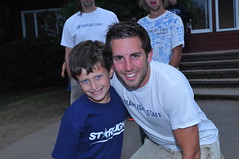 In contrast, one past camp counselor explains, “time management is crucial at camp,” and even if you are familiar with regimented schedules, “a camp counselor is responsible for keeping others in line with the daily schedule.” So the job requires not only learning to manage time personally, but also for large groups and that becomes a skill counselors develop. Camp counselors also “learn to be disciplinarians in strategic ways.” These skills are essential and applicable to keeping an undergraduate student motivated to complete assignments and participate in college activities. So, since professional experience at camp requires “all counselors to be responsible,” and to “learn to be accountable for personal actions as well as those of others,” camp counselors benefit in multiple ways.
In contrast, one past camp counselor explains, “time management is crucial at camp,” and even if you are familiar with regimented schedules, “a camp counselor is responsible for keeping others in line with the daily schedule.” So the job requires not only learning to manage time personally, but also for large groups and that becomes a skill counselors develop. Camp counselors also “learn to be disciplinarians in strategic ways.” These skills are essential and applicable to keeping an undergraduate student motivated to complete assignments and participate in college activities. So, since professional experience at camp requires “all counselors to be responsible,” and to “learn to be accountable for personal actions as well as those of others,” camp counselors benefit in multiple ways.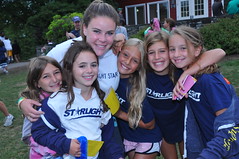 2. Independence and freedom
2. Independence and freedom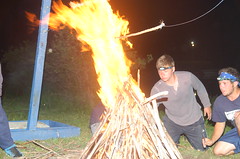 According to American Camp Association
According to American Camp Association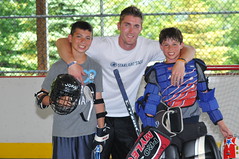
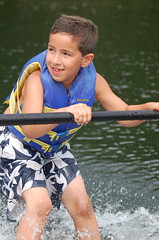 As children mature, they continue to develop and require more experiences where they can make independent choices without parents. If parents don’t allow children to make decisions and do things on their own, they won’t develop confidence or realize that they are not just extensions of their caregivers. It’s a tricky line that parents walk! Sometimes giving children room to spread their wings seems counter intuitive, but in order to grow into a self-reliant adult, children need to struggle without the offer of a quick fix. Even when parents can take care of things, the better choice is to support a child through the process of working through and solving problems. Long after a problem has been forgotten, a self-reliant child will remember hearing, “Wow! You amaze me! You really worked hard to figure that out.”
As children mature, they continue to develop and require more experiences where they can make independent choices without parents. If parents don’t allow children to make decisions and do things on their own, they won’t develop confidence or realize that they are not just extensions of their caregivers. It’s a tricky line that parents walk! Sometimes giving children room to spread their wings seems counter intuitive, but in order to grow into a self-reliant adult, children need to struggle without the offer of a quick fix. Even when parents can take care of things, the better choice is to support a child through the process of working through and solving problems. Long after a problem has been forgotten, a self-reliant child will remember hearing, “Wow! You amaze me! You really worked hard to figure that out.”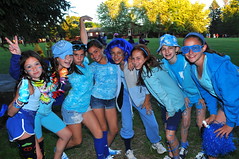 Of course, the
Of course, the 